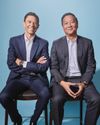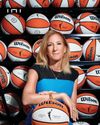
THE RED LOTUS Esprit slips past the security gate, leaving behind the large, Spanish-style house and its sumptuous backyard pool. Vlad Tenev smiles as he grips the wooden-sphere stick shift and nudges the sports car into higher gear. Soon, the car is lapping up the oak-shaded curves of a Los Altos Hills back road as it winds toward the heart of Silicon Valley.
The 1987 Lotus is a striking vehicle, with couch-like leather seats barely off the ground, and mini cigarette lighters and ashtrays on each armrest. The car’s top speed is a modest 148 mph. It’s an unusual ride for a billionaire who could easily spring for a garage full of McLarens and Bentleys, but it clearly delights Tenev.
For the CEO of Robinhood, the Lotus is the fulfillment of a dream, held by many overgrown boys, of owning the car you drove in a childhood video game. It also embodies the values of unconventional design and rule-breaking that Tenev has sought to emulate at his company.
Cars can be a metaphor for going fast, achieving independence—or driving off a cliff. All of those feel appropriate for Tenev and the company he cofounded, which in barely a decade has worn very different identities, including feel-good startup and archvillain. Today, for the first time in a while, Robinhood’s road is smooth and wide open.
Love or hate Robinhood, there’s no denying it has, more than any other company in recent memory, changed the way Americans invest. It popularized rash mass purchases of stocks like GameStop and Dogecoin, but also spurred the broader brokerage industry to copy its no-cost, mobile-first approach. Robinhood has grown fast: It had 24.1 million funded accounts at the end of May, up from 12.5 million in 2020, and its assets under custody have bulged to $135 billion. And it has transformed the demographics of investing, helping millions of people get a piece of the stock market for the first time.
This story is from the August - September 2024 edition of Fortune US.
Start your 7-day Magzter GOLD free trial to access thousands of curated premium stories, and 9,000+ magazines and newspapers.
Already a subscriber ? Sign In
This story is from the August - September 2024 edition of Fortune US.
Start your 7-day Magzter GOLD free trial to access thousands of curated premium stories, and 9,000+ magazines and newspapers.
Already a subscriber? Sign In

KKR'S $1 TRILLION GAMBLE
The co-CEOs of KKR have a radical strategy to supercharge growth - and chart a path far different from that of their mentors, Henry Kravis and George Roberts.

THE SHIPWRECKED LEGACY OF MIKE LYNCH
THE BRITISH TECH MOGUL SOLD HIS COMPANY FOR $11 BILLION, THEN SPENT YEARS FIGHTING FRAUD CHARGES. HIS SHOCKING DEATH HAS LEFT MANY UNANSWERED QUESTIONS ABOUT HIS LIFE.

FORTUNE - CHANGE THE WORLD
THESE COMPANIES BUILD BUSINESSES AROUND SOLVING SOCIAL PROBLEMS AND THEY DO WELL BY DOING GOOD.

Can Cathy Engelbert Handle the Pressure?
The WNBA commissioner and ex-Deloitte CEO is leading the league through a season of historic highs, but critics wonder if her game plan is good enough to seize the moment.

Kamalanomics: Harris's Road Map for Business
Vice President Kamala Harris hasn't done much to woo Big Business. Many executives would still rather take their chances with her than the alternative.

Mary Barra
The CEO of General Motors accelerates into our top spot.

MPW - MOST POWERFUL WOMEN 2024
WHEN FORTUNE launched its Most Powerful Women list in 1998, women were just starting to trickle into the C-suite in significant numbers.

WHO HAS TIME FOR A POWER LUNCH? THE REAL BUSINESS HAPPENS AT 4 P.M. 'POWER HOUR.'
THE SUN is pouring in through the floor-to-ceiling windows when the bar begins to fill with bespoke suits on a Tuesday in August at Four Twenty Five. The new restaurant from Jean-Georges Vongerichten is on the first floor of a Midtown Manhattan skyscraper, beneath the offices of financial giant Citadel Securities. And the traders are thirsty.

HOW TO TAKE ADVANTAGE OF THE FED'S BIG RATE CUT
THE WAIT IS OVER. After more than a year of will-they-or-won't-they, the Federal Reserve on Sept. 18 announced the first cut to its benchmark Federal funds rate since the early days of the COVID-19 pandemic, a 50-basis-point drop that Chairman Jerome Powell signaled is likely the first of many.

FOR GEN Z AT WORK, THE GENERATION GAP IS A WELLNESS GAP. HERE'S HOW TO BRIDGE IT
FOR ONE nonprofit executive director, it was a 2022 New York City subway shooting that highlighted the stark differences between how he, a 55-year-old, and his Gen Z staffers show up to work.